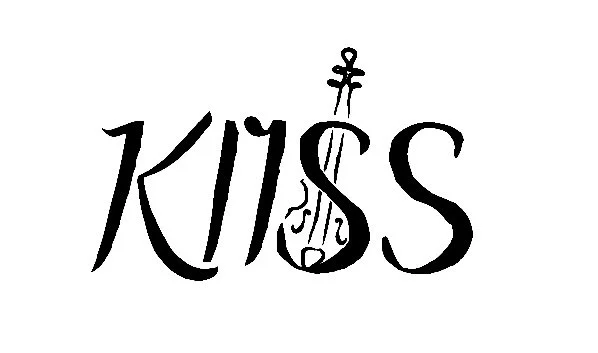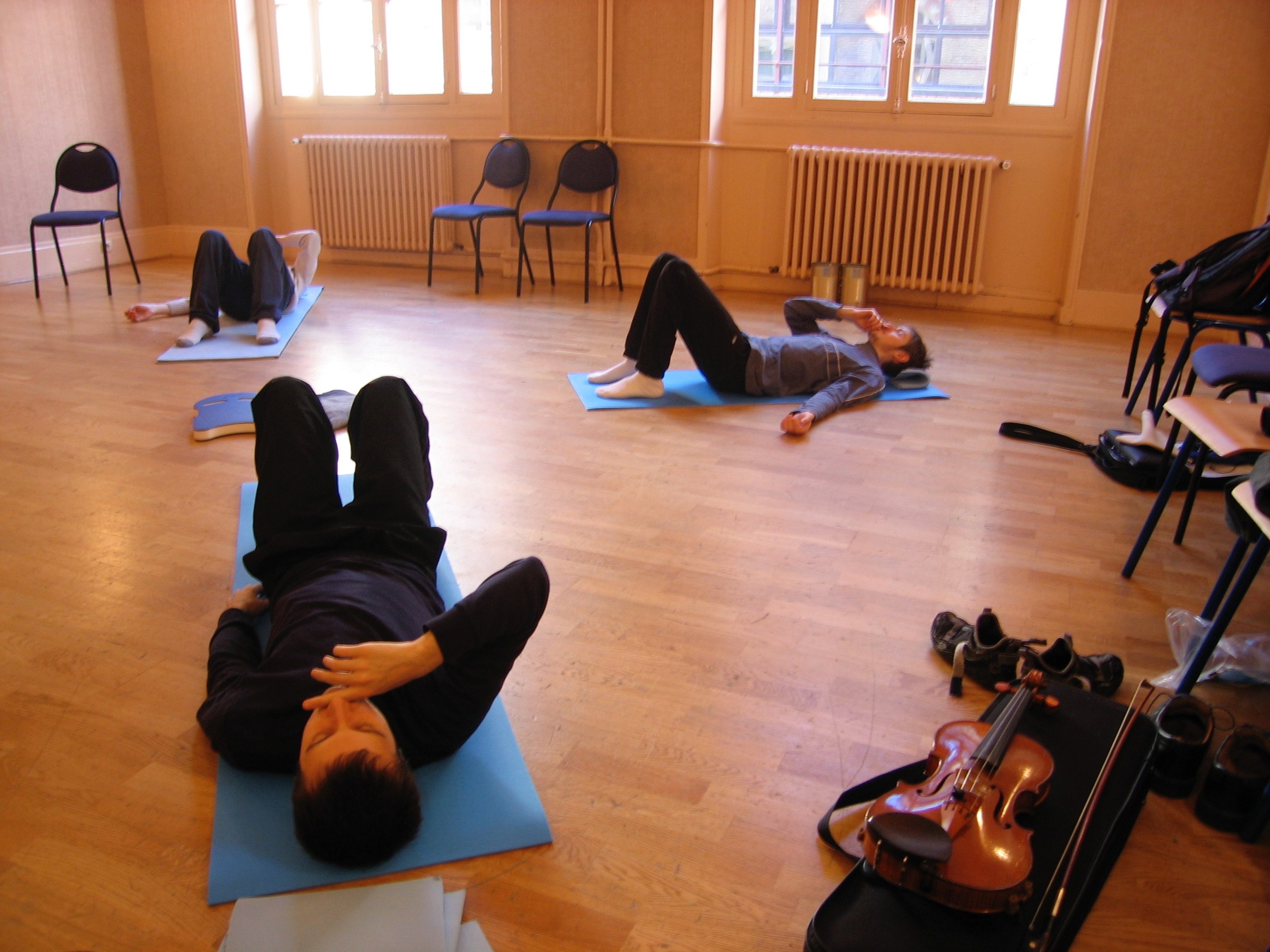The Feldenkrais Method at K.I.I.S.S.
Taught by Colin Pip Dixon
Feldenkrais classes will be available for anyone who wishes to participate. No previous experience is necessary!
Colin will be offering a more in-depth experience for participants who wish to sign up. There will be a daily group session and individual Feldenkrais work around the theme of “Grounding – finding more support, stability, and freedom with your instrument using the principles of Feldenkrais”.
Why Feldenkrais?
Making music is the act of transforming movement into sound. All instrumental technique is small, refined, coordinated movement. Wouldn’t it make sense, then, for musicians to not only study instrumental technique, but to learn how to move with greater ease, fluidity and elegance? There is no separation between the ease and beauty of the gesture and the ease and beauty of the sound that comes out of the instrument.
The Feldenkrais Method is a tremendous complement to our work as musicians. It enables us to connect with our bodies, with our potential for easier, more efficient movement and it can give us the keys to overcoming limitations, essential elements that are often missing in our instrumental training.
We have all had those experiences when you pick up your instrument and play and everything flows and responds exactly as you wish – it is effortless, beautiful and free. But there are also those times when one tries to play and nothing seems to work the way you know it can and you have the impression that your body is working against you. Feldenkrais teaches us how to cultivate and call upon that “best playing self” so that one can experience greater joy and fulfillment in music.
About the Feldenkrais Method
The Feldenkrais Method® is a means of becoming more aware of one’s body and how one uses it in order to find more comfort, ease and efficiency in all movement and actions. For musicians, quality of movement translates directly into sound. When we find more ease, power, and freedom physically, our technique and expression improve exponentially.
Developed by Dr. Moshe Feldenkrais (1904-1984), an engineer, physicist and world-class Judo master, the Feldenkrais Method is based on principles of neuroscience, physics, biomechanics and child development. It taps into the brain’s neuroplasticity, the brain’s ability to change and adapt as a result of experience. It combines the intelligence and precision of the scientist with the intuition and playfulness of the artist.
The lessons consist of simple, guided movements. These movements are designed to increase awareness of the body and habit patterns, guiding individuals to explore new and more efficient ways of moving and eventually creating new pathways in the brain.
The emphasis is on quality and ease of movement. There is no “model” to follow, nor a “right” posture to be attained. Efficiency of movement is found through sensation and awareness rather than through mental willing or muscular strength.
For musicians the applications are countless. The method can be applied to:
find a more efficient technique and overcome stumbling blocks in ones development
improve stage presence and auditioning skills
overcome the negative effects of performance anxiety
find more physical comfort while playing an instrument
overcome and prevent potential instrument-related injuries
create a more resonant, beautiful sound
improve one’s teaching capacities
adapt more easily to unexpected conditions
develop a more creative and embodied relationship to practice and one’s instrument.
Most of all, it can lead to creating and cultivating that “flow” in our playing where nothing seems to get in the way and our inner intention is translated directly into action, into sound and into expression. Through a more embodied relationship to one’s instrument it can help remove all the barriers to fulfilling one’s potential.
Colin Pip Dixon’s Feldenkrais Bio
Colin Pip Dixon has been offering and developing his Feldenkrais work with musicians for almost 20 years. His approach to teaching Feldenkrais for musicians comes from a desire to share with as many colleagues and students as possible this work that has been a revolution for him personally in his own life as a musician. Colin sees his role not so much as teacher, but rather as creating the space and the conditions in which each individual can learn from themselves what they most need. As an active performer himself, everything he teaches is informed by the direct and real experience of performing rather than based on idealized theories.
He completed his professional training to become a Guild Certified Feldenkrais Practitioner (GCFP) in Paris, France in 2007 under the direction of Myriam Pfeffer (one of Dr. Moshe Feldenkrais’ first students and assistants) and Paul Newton. He furthered his experience and knowledge through many advanced trainings and as an interpreter (Eng/French) for many professional trainings and advanced trainings in Paris, allowing him to work with a vast range of renowned Feldenkrais trainers from around the world. While living in France, he organized and taught monthly workshops in Paris for musicians from 2007-2012 working with many students from the Paris and Lyon conservatories and was invited to lead Feldenkrais workshops in several conservatories and arts institutions throughout France (Conservatoire Nationale de Reims, Ecole de Musique de Noyon, le Café des Arts de Grenoble, Théâtre Trianon, the Baroque theater company La Fabrique à Théâtre, etc).
In New York City he organized workshops with students participating from Juilliard, Manhattan School of Music, CUNY, Stony Brook University, etc and taught music instructors at the Third Street Music School. He was on staff at The West End Fitness Club to teach Feldenkrais to the general public for several years and has taught many classes at Eugene Yoga in Oregon.
He has been invited to give workshops for undergrad and grad students at Stony Brook University, The University of Oregon, Oregon State University and Pacific University as well as for High School students at the Metropolitan Youth Symphony (Portland) and Oregon State University Chamber Music Workshop. He has been invited to give talks and lead workshops for several years at the National ASTA Conferences (American String Teachers’ Association) along with Oregon Statewide conferences, and at the Oregon Music Educators Association Statewide conferences.
Since May 2020 he has been giving weekly classes and workshops for musicians online as part of the faculty of Virutosity.Online
TESTIMONIALS from past participants:
“After having done the Feldenkrais Method I no longer look at my body as a collection of problems, pains or things which are wrong, but as an immense open space of possibilities, almost infinite! I think that the most important benefit of Feldenkrais in my professional life was gaining much more confidence in myself. I am not really someone who lacks confidence, but like most people I can become more vulnerable in certain situations. Feldenkrais taught me to find confidence through my body and not by willing it.”
“The progress that I made practicing the method translated directly into the instrument. As much as I felt my muscular tensions diminish, I felt my level of playing improve. If I was hesitant at first, I was convinced by the very first workshop. I remember perfectly the sound that my violin produced was completely different the same evening after the workshop! I felt this change myself, and this change was confirmed by someone (a pianist) who hears me play every day. I don’t know any other method that allows you to measure such important results in so little time. The more I was able to enjoy what I was doing, the better I felt and the better I succeeded.”
“These Feldenkrais workshops truly revolutionized my artistic and musical life: working on oneself in a group allowed me to realize that many of our fears are the same, and being able to share them helps to undo them. I gained a lot of self-confidence from the experience and also found concrete tools to help me to relax or to find my sound before an orchestra audition or a concert.”
“Feldenkrais gave me a much finer sense of my body as well as a much more efficient conception of how to work. It helped me to discover “parts” of my body that I was ignorant of and to experience new sensations which I’m persuaded have, in one way or another, changed my playing and my relationship to the piano.”
“I only did one full-day workshop with Colin. I had heard very little about the Feldenkrais Method so it was all a new experience for me. The theme was about the sitting position. I was particularly interested in this subject because, as a violinist who plays in an orchestra, I often wondered about what was a good seated position. Since this workshop (three years ago), I can say that I have never suffered from back pain linked to being poorly seated. Until this day I still feel good thanks to the way I became aware of different aspects of my body. Musically speaking I also became conscious of a solid and stable anchoring which helps in using the body as an extension of the resonance of the instrument itself, expanding the potential for sound in the instrument. The only reason I didn’t continue to discover new aspects of this extremely rich method was because of a lack of time”
“I feel truly transformed by this work, both as a musician and as a person. My awareness of my body has developed enormously, helping me a lot with my piano technique. My way of working has evolved : I practice less like a student now, with more variety and with much more efficiency than I did before. I also feel more peaceful emotionally when I work. Since I’ve started practicing Feldenkrais I enjoy being on stage much more and feel the difficult aspects of performing much less. What I really appreciate about the type of work that Colin offers is the relationship between the lessons and playing one’s instrument.”


